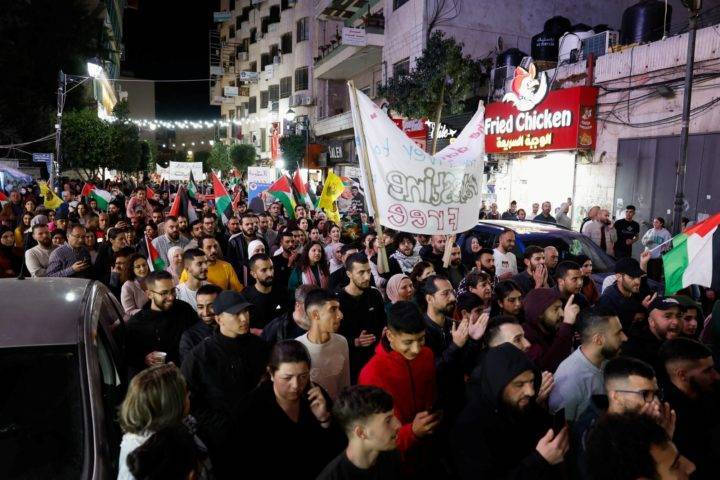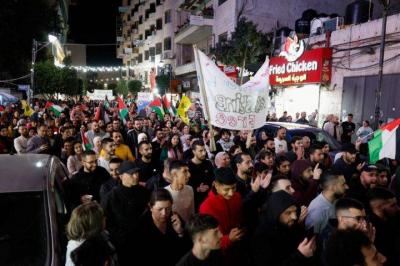A significant attack launched by the Fatah movement, led by Palestinian Authority President Mahmoud Abbas (Abu Mazen), against Iran has raised local and regional questions regarding its motivations and messages, especially as it coincides with an ongoing Israeli war against the Gaza Strip and a state of unrest in the West Bank. Fatah accused Iran of instigating chaos and instability in the Palestinian internal arena in a manner that only benefits the Israeli occupation. The movement stated in a statement released on Tuesday evening that it rejects Iranian interventions and will not permit the exploitation of the Palestinian cause or the blood of Palestinians for dubious projects unrelated to the Palestinian people or the national cause.
Fatah issued this statement following violent clashes between armed Palestinians (affiliated with the so-called Tulkarem Battalion) and security forces belonging to the authority in Tulkarem, northern West Bank, which resulted in deaths and injuries that exacerbated the suppressed tensions in the West Bank. Fatah warned, without specifying a particular party, that it will be vigilant against those causing chaos and will cut off the hand that seeks to disturb its arena or harm its security forces or any of its national institutions.
Fatah reaffirmed its confidence in the security forces' ability to quell the sedition and confront all those who disrupt order.
**Civil Disobedience**
Violence erupted between armed militants from the Tulkarem Brigade, which Israel has accused of carrying out operations, and the authority's security forces, during which a member of the brigade was killed. The brigade later announced civil disobedience against the authority, a scene that has been repeated recently in northern West Bank areas where Israel claims the authority has lost control to Hamas and Islamic Jihad.
While the security forces accused militants of initiating fire against them, the Tulkarem Brigade, affiliated with the Al-Quds Brigades (the armed wing of Islamic Jihad), mourned one of its field leaders who was killed by the Palestinian security forces. The brigade stated: "We mourn the martyr engaged in combat and the field commander of the Tulkarem Brigade, son of (Nur Shams camp) Mu’tasim Khalid Al-Aref, who fell at the hands of the security forces." Following this, the brigade declared a civil disobedience by blocking all entrances to Tulkarem, especially the entrances to Nur Shams camp, using dirt mounds and explosive devices until the fighting ceases.
According to authority sources, the militants were the ones who started firing, but the Tulkarem Brigades accused the security forces of overstepping in their pursuit of the resistors.
**Recurring Clashes**
Local Palestinian platforms broadcasted violent armed confrontations between the two parties, echoing clashes that erupted two weeks ago in Jenin, northern West Bank, after Israel assassinated individuals wanted by them, during which armed militants besieged the governor's office, demanding the release of detainees.
From time to time, clashes break out between armed militants and Palestinian security forces in the West Bank, representing another type of war that seems more intense on social media platforms. There is significant incitement against the Palestinian Authority on Telegram, suggesting that the authority collaborates with the Israelis against the fighters in the West Bank. The authority views this incitement as organized rather than grassroots.
Fatah spokesperson Jamal Nazzal stated that Iranian footprints in the Palestinian reality are present and destructive, as there are Iranian hotspots in certain areas of the West Bank like Tulkarem. Accusations against Iran are not new, but they have arisen amidst a complex and sensitive situation, with the continued Israeli assault on the Gaza Strip and the West Bank, as well as highlighting the deteriorating relationship with Hamas, which accuses the authority of supporting it and exacerbating divisions.
A high-ranking security source told the "Middle East" that Hamas incites against the authority in the West Bank, as well as in Jordan and elsewhere. He added: "Despite that, the authority does not fight (Hamas); rather, it fights the chaos and disorder that Israel incites. Armed individuals, whether intentionally or out of ignorance, serve only Israel." The source warned that chaos weakens the authority and destroys community life. "There is no need for death and destruction in Gaza, and chaos and disorder in the West Bank. We will not allow that."
The source urged Hamas to focus on the occupation, which has violated all of Gaza and is encroaching upon the West Bank and Jerusalem, rather than confront the Palestinian Authority.
**Authority's Concerns**
Since the onset of the Israeli war on Gaza, Hamas has been pushing the West Bank toward a greater confrontation with Israel, making explicit calls for open resistance—calls that the Islamic Jihad has also joined—but the response has been less than expected. Armed individuals have carried out attacks against Israel in the West Bank, but these have not risen to the level of an uprising or a surge that can be built upon.
The authority does not support these attacks, believing they could be devastating and enable Israel to inflict further harm on Palestinians in the West Bank, and it perceives that the arrows are beginning to be directed at it instead of Israel.
Fatah insists that what is happening in the West Bank is an attempt to shift the focus during a sensitive period, an attempt extended to Jordan as well. Fatah rejected the exploitation of the Palestinian cause to incite the Jordanian street and create chaos there, compromising security as well.
The authority's fears of a broad scheme in the West Bank come at a time when it is suffering from both security and economic issues, appearing weak or almost absent, or against popular sentiment at times. The authority had launched an extensive reform plan affecting the government, governors, and security chiefs in an attempt to restore dignity and control, in preparation for a phase that could exacerbate both challenges and disputes, particularly in the Gaza Strip, which is still controlled by two factions that currently reject the authority: Israel above ground and Hamas underground.




